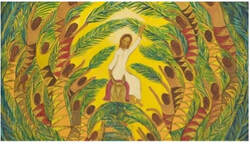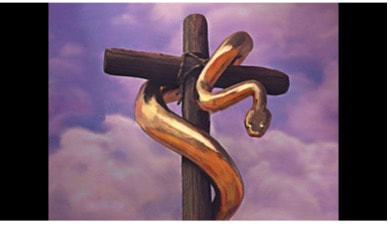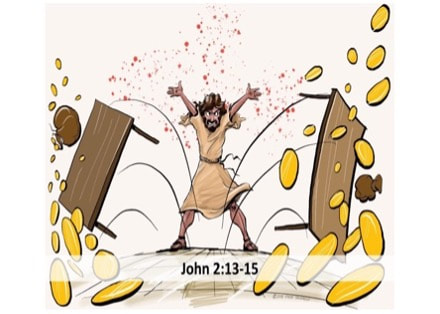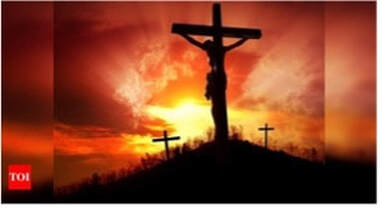Reflection: "Hosannas Before the Storm" Imagine it’s Cracker Night (when it was still legal, many years ago).
You take a cracker, a nice big one, a penny bunger. You get your match, light the cracker and throw it away into a clear space. You wince your body, cover your ears, and wait, but….…nothing happens. So, you walk over to it, kick it with your boot, look at it a little more carefully and sense that it’s gone out. You pick it up, break it in half and now you know for sure that it’s a dud. Well, I think that might have been a bit like how Palm Sunday went, all those years ago, in Jerusalem. Jesus came into town riding on a young donkey, a colt - and the expectations of a big bang were high. But it all ended up being a dud, just a plain fizzer. Let me explain. On this day, when Jesus came riding into town there were heaps of people in Jerusalem. That’s because, it was a requirement for all Jewish men to make a pilgrimage to the Passover festival in Jerusalem, at least once in their life. We know now that Jesus had a higher motive than this for his visit. As Jesus slowly entered that city, people were jamming the streets and they were yelling, “It’s the Messiah. Hosanna, it’s the Messiah, the Messiah is coming, just as it’s been promised in the scriptures.” They’d heard about him and were excited about what he was going to do to help them out of their predicament – the occupation of their lands by the Romans. They were expecting a warrior king - but that’s not the message that Jesus is planning to bring to them. Soon their voices became one and they chanted together, “Hosanna to the Son of David.” They ripped the clothes off their backs and tossed their cloaks on the ground in front of Jesus, grabbed palm branches and were waving them with gusto. As Jesus approached the centre square of the city, the crowd was intense, shoulder-to-shoulder. Jesus got down off the donkey, and the crowd were wondering what he was going to say and do next. Wondering if all the angels from heaven were going to come down right now. But Jesus simply got off his donkey, walked into the temple where he had taught so many times before. They probably said to one another: “Maybe the temple will fall apart; maybe it’ll explode. Who knows what’ll happen next?” As Jesus went into the temple; all eyes were watching; all eyes were on him. He looked around, then came back out of the temple and did……… nothing. He looked around, got up onto his donkey and said to his twelve disciples, “Let’s go to Bethany.” Then he left. What a fizzer. Here they were, expecting the promised Messiah, the King who was going to save them, but nothing happened. The crowd slowly began to leave and then got angrier and angrier and angrier. The next day, it started as a whisper, “Crucify him” and by the eve of the Passover, Good Friday, they were all shouting at the top of their lungs in unison: “Crucify him, crucify him, crucify him. Crucify that common, ordinary carpenter. He’s no Messiah. He’s a dud.” Well, that may have been how it was on that first Palm Sunday. What happened, they would have wondered? Why did it turn out to be such a non-event, such a dud? It appears that the people of God had misunderstood the promises of God. It happened throughout history and is still happening today. In the early days of the relationship with God and his people, as we read in the Old Testament, God promised the people that he would give them the Promised Land, the land of Israel. A good land. A beautiful land. A lush land. But what did the Promised Land turn out to be? It was filled with all sorts of other people who were happily settled in the land, so it took 200 years to conquer it. 200 years of fighting to make the promised land their own. Was that part of God’s promise? The Jews had heard only the part of the promise that they wanted to hear. The part they liked was where God said: “I’ll give you a land filled with milk & honey.” The Jews didn’t hear, or want to hear, the hard part where it would take 200 years to conquer it. We still twist the promises of God and only hear what we want to hear, omitting the hard parts of the promise. Everywhere in the Old Testament there are promises of the coming Messiah. The Messiah was going to be a wonderful counsellor, mighty God, an everlasting father, and the prince of peace. This new Messiah was going to bring justice and peace to the land. Then, along comes Jesus, riding into town on a donkey, just like the prophets had foretold. But what did the promise turn out to be? Did this person turn out to be a wonderful counsellor, mighty God, everlasting father and prince of peace? Not in their eyes, because they weren’t looking for such a person - as I said earlier, they wanted a warrior King. This Messiah turned out to be a tradesman who rode on a jackass and got himself killed by Friday afternoon, so it didn’t work out the way they wanted, at all. He didn’t meet their expectations. Once again, the Jews picked only the best parts of the promise, the best parts of the passage, the best parts of the flower, the best parts of the Bible, omitting all the other parts of the promise. All throughout history, we’ve taken the promises of God and twisted them to meet our own ends; we twist the promises of God to meet our own happiness; we twist the promises of God to meet our own expectations. So, what is it that we want? We want to avoid anything that has to do with suffering, death, struggle or sacrifice. No suffering. No death. No struggle. No sacrifice. We omit all those parts of the promise. To use a floral analogy, we want the rose blossom, but we don’t want the thorny stem. In other words, we always want Palm Sunday but not ‘Passion Sunday’ – the Sunday leading to the passion of Christ on the cross - and that’s what happened on that first Palm Sunday. God promised Passion Sunday, but the people wanted the drama of Palm Sunday. Anything that had to do with executions, crosses, suffering and death - the people of God didn’t want to hear about. It seems to me that the fulfilment of God’s promises always involves suffering and struggle, whether it’s a promise about peace, or the abundant life, or freedom. All these great promises from God involve struggle, suffering, discipline, death, and injustice. There are always big thorns on that rose bush, and we, the people of God, intuitively want to avoid that. We want to delete that part of the promise. God has promised us a new kingdom, so let’s not distort what he’s offering by just looking on the rosy side. We also need to take the hard parts with the good, but make no mistake, this new kingdom will be beautiful. It surely was an extremely testing and trying time for Jesus. It was the culmination of his ministry on earth and the basis for the faith of those of us called Christians, his disciples. Let’s thank God for his generosity to us, by working hard to continue building his kingdom here on earth. So, we eagerly await the passion of Jesus as it unfolds before us in the Holy Week to come. He endured this for us, so that our sins are forgiven, and we can join him after we pass on from this mortal life. Blessings on this commencement of Holy Week……..Pastor Rick
0 Comments
Reflection: "GRAVE TALK" This week's Reflection is offered by Liam McKenna, Lane Cove Community Chaplain. Matters of life and death have a way of focusing one’s attention. It has not been long since Lazarus, still wrapped in grave cloths and smelling four days dead, stumbled out of the tomb and into the waiting arms of his sisters and friends. Now that life is getting back to normal (can life ever be normal after somebody is raised from the dead?), one might expect the focus to turn to the impending feast of Passover. However, even that greatest of festivals cannot hold a candle to the Light of the World, who has, after all, just brought his friend from death to life with only a heavenward glance and the strength of his voice. That is precisely what troubles the Pharisees. They and the rest of the religious establishment are powerless against this Galilean man who claims to have come from the Father in heaven. Already many of the Jews are believing in him. Before too long, the Pharisees fear, everyone will follow after him, causing the Romans to come and destroy their temple and the nation (John 11:45-48) and strip them of their authority. Their worst fears are confirmed when the crowds who had been at Lazarus’ tomb begin to testify. “Look,” the Pharisees exclaim, like the representatives of a failed ad campaign, “the world has gone after him!” (John 12:19). We want to see Jesus In this week's Gospel reading the world is focused on Jesus to such an extent that even some Greeks are anxious to lay eyes on him. They engage in a little first-century social networking with Philip, the disciple with the Greek name, a person whom Jesus had “friended” near the start of his earthly ministry (1:43). And it is no wonder they want to see Jesus. After all, he has been inviting folks to “come and see” from the very beginning (1:39). Plus, there is the matter of all those signs, of which the raising of Lazarus is only the most recent. It is easy to imagine how seeing water turned to wine or a man given his sight would lead people to believe in and follow One who can do such things (see 4:48; 6:30; 11:45). Seeing is believing in this Gospel (6:14, 30; 19:35; 20:27), so when the Greeks ask to see Jesus, they are, perhaps, expressing their desire to believe. Whether they are successful in meeting Jesus we are not told, but Jesus’ response to their query refocuses the terms of the discussion. No longer is it enough to come and see Jesus; from “this hour” forward his followers are invited to come and be with Jesus. Whoever serves me must follow me At the beginning of his ministry, Jesus invites his disciples to “follow me” (1:43), and he promises the “light of life” to those who do follow (8:12). However, on more than one occasion, he tells some of “the Jews” that they cannot come where he is going (7:34; 8:21). Later during this Passover festival, he says the same thing to his disciples (13:33). Nonetheless, it is clear that a time will come when they will be able to follow him (13:36). Indeed, he says, he will go first “and prepare a place for you,” and then “come again and take you to myself, so that where I am, there you may also be.” (14:3). Making it possible for his followers to abide together with him seems to be a core purpose of Jesus’ ministry, as he prays to God that “I desire that those also, whom you have given me, may be with me where I am” (17:24). Where I am, there will my servant be also Where is Jesus? He is with the Father (1:1; 14:11), and he dwells among us (1:14; 14:23). He is leading his followers to eternal life as he moves toward the hour of his death (12:32-33). Before much longer he will be “lifted up” on the cross (12:32, 34; 8:28) where he will lay down his life for his friends (15:13). Even as a grain of wheat falls to the earth in order to fulfill its true purpose, Jesus is lifted up from the earth in order to fulfill his, so that he may draw all people to himself. (12:24, 32). It is there, at the cross, that we will see his glory (17:24). The hour has come Following Jesus is a matter of life and death. Or, to put it another way, life and death matter to those who follow Jesus. During this season of Lent we follow him all the way to Golgotha, all the way to the cross, where we will stand beneath it, together with those followers who asked at the beginning of his ministry, “Where are you staying?” (1:38). It is there, in the face of the world’s many ways of death (e.g., poverty, economic collapse, hunger, sickness, war) that we are drawn even closer to Jesus. It is there, in the light of the stark reality of life at its end that we begin to catch a glimpse of life at its fullest. Jesus promises, “When I am lifted up from the earth, I will draw all people to myself” (12:32). It is for such a time as this that Jesus has brought us to this hour. There is nothing like impending death to focus our attention is there. Reflection: "New Lives in Christ"Even in a time when many people don't know much about the Bible, there's a verse that most of them know by heart.
Sometimes we don't even have to recite it; just the bible reference will do: "John 3:16" You may have even seen it held up on painted signs or banners at sporting matches. It suggests the heart of the Christian message, summarising what God did in, and through, Jesus. "For God so loved the world that he gave his only Son, so that everyone who believes in him may not perish but may have eternal life." The short form is: "God so loved the world." That pretty much says it all - doesn't it? It's the good news in a nutshell. On this Fourth Sunday in the season of Lent, let’s go deeper into this familiar passage from John. To do that, we have to go on a journey into the distant past - all the way back to the Old Testament book of Numbers. The people are in the Sinai desert, following Moses on a circuitous trek, out of slavery, toward the land that God has promised them and they’re following Moses half-heartedly because, after such a long journey, they’ve begun to doubt their leaders and even wonder if there is a promised land at all. This rag-tag band of pilgrims have begun to murmur - that is, they’re complaining about the hard life of the desert. The strange, God-given diet of manna and quail, and the uncertainty of their serpentine route, aren’t pleasing them. And it was serpentine in more ways than one! In the 21st chapter of Numbers, somewhere out in this seemingly God-forsaken desert, God sends a plague of poisonous snakes. The snakes were plentiful, they were poisonous, and people began to die. The people went to Moses, suspecting that the snakes were a form of divine retribution for all their complaining. They asked Moses to intercede for them with God - and he obliged.God tells Moses to fashion a serpent of bronze and put it on a pole. Then, if any of the people are bitten by a poisonous snake, they should be told to gaze at the bronze serpent so that they will be healed. Interesting concept, isn't it? Look at a snake and be cured of snakebite. But God’s suggestion worked and those who had been bitten were healed after gazing at the bronze serpent. End of story? Not really. Turning to the book of Second Kings, Chapter 18, we read that for 500 years after Moses, we haven't heard another word about this bronze serpent. By now the people have settled in the Promised Land and they decided to have kings, as other nations did. Many of those kings were disappointing and corrupt, but one king came along who was different. His name was Hezekiah and he cleaned things up in the land by removing the high places, breaking down the pillars, and cutting down the sacred poles. In effect, what he did was destroy the pagan worship places, which had cropped up around the land. Then we read that he: “broke in pieces the bronze serpent that Moses had made, for until those days the people of Israel had made offerings to it." Do you see what had happened? Five hundred years after Moses had made the bronze serpent as a means of healing the people, they still had it - and it, too had become an idol. That is, what had been a means to an end, had become an end in itself! Instead of pointing toward the God who had ordered it made, it now pointed toward itself - and the people worshiped the serpent, instead of the God to whom it was supposed to point. I wonder what the people's reaction was when King Hezekiah smashed that five-hundred-year-old bronze serpent - after all, it had been made by Moses himself, a precious antique, a part of the nation's history. Sometimes, we Christians begin to worship what is old, but is no longer useful. We have our traditions, and we rebel against change. These two Old Testament passages about the bronze serpent illustrate a necessary point. What had been helpful and healing in one era had become an idol in another. I wonder: how many things in the life of our churches used to be helpful and healing but have outlived their usefulness? How many old traditions have we turned into idols? There is much discussion these days about the church's failure to attract and engage young adults. The 2021 census shows that even though Christians make up 43.9% of the population, the most rapid growth in religious following is among the "No’s" - that is, those people who answer the question of religious affiliation as: "No Religion." I can't help but wonder if those who try our churches, find us gathered around various prized bronze serpents that we should have smashed long ago. Now that I'm in my early-seventies, and have been involved in churches for most of that time, I must confess that I’ve been exposed to many such serpents. People like me must challenge ourselves, asking which among these objects are no longer helpful or healing. What means to an end have we turned into ends in themselves? Good King Hezekiah smashed the bronze serpent, in spite of what I'm sure were numerous complaints from the Hebrew Historical Architectural Review Board. And in so doing, he proved to be an example of the spirit of reform. But that wasn’t the end of the serpent. It has come back in the New Testament, in today’s gospel reading! That old bronze serpent - made by Moses and smashed by King Hezekiah - has come back at the end of this serpentine story. Jesus is not saying that a serpent on a pole can heal you; he’s saying that, just as the serpent was lifted up in the wilderness to heal, so he, Jesus Christ, the Son of Man, must be lifted up on a cross to be able to save us. Just as he told Nicodemus, we must be born from above. We must discover the incredible world of the Spirit. Do you see where this serpentine, meandering story of the snake has taken us? From the desert wanderings of Moses' rag-tag band, to the hill of Calvary. And there, we hear the call to lift up our eyes and see the one who saves us and gives us abundant life. Now the snake of Moses has led us to that favourite verse, that "gospel in a nutshell": "For God so loved the world that he gave his only Son, so that everyone who believes in him may not perish but may have eternal life." And it is followed by this great, final word in verse 17: "Indeed, God did not send the Son into the world to condemn the world, but in order that the world might be saved through him." In Jesus we find new life - so lift up your eyes, lift up your hearts - the story has come down to this: Because God loves us, we can have new lives in Christ. Halleluiah……………Pastor Rick Reflection: "Clearing Out"Our story this week (from the Gospel of John) is not simply a story about Jesus getting angry (which he rarely did).
I occasionally get angry and I’m sure that you do at times. It’s a human trait to get angry. But that misses the point. There’s more to this story than just that. And I don’t think it’s about the animals, or the moneychangers, being in the temple, either. Jesus must have known they were there, because he grew up as a faithful Jew, going regularly to the temple. I think Jesus went to the temple that day for one purpose; to throw out and overturn “business as usual”. Have you ever pushed your “auto-pilot” button and let your life become mechanical, just following a routine - “business as usual”? Sometimes, we just go through the motions - showing up, but not really being there. But that’s just the symptom - not really the problem, in the same way that the animals and moneychangers in the temple are not the problem, but the symptom of something deeper going on. Perhaps we can interpret what’s happening in the temple as what’s going on in our human hearts. There are times when we need the tables of our life overturned, and to clear out the rubbish. Have you ever pondered what it is that gives rise to our “business as usual” attitude? Sometimes it’s because of fear – maybe of what’s happening in our life, or the uncertainty of the future, and we want some sort of security and predictability – so we just keep on doing the same old routine, hoping that nothing will change. Business as usual is predictable and steady, but it only creates the illusion of security.Business as usual can be a symptom of our grief and sorrow – such as when we’ve lost something, or someone. We can’t get back the life we want, so we cling to business as usual because it’s familiar and we want some stability. This can keep us functioning for a while, but we need to work through the issues and heal and find a ‘new’ life without whatever, or whoever, we’ve lost. At other times we’re so busy and worn out making a living, that life turns into one task after another, one appointment after another, a never-ending to-do list – and, then, it’s back to business as usual again. There are thousands of reasons and ways in which we fall into business as usual. Business as usual is born of forgetfulness; when we forget that WE are actually the temple of God’s presence. We forget that creation is God’s residence and, whatever direction we turn, the face of God is gazing upon us. As soon as we forget those things about ourselves, each other, or the world, life returns to business as usual. Maybe that’s what happened in the temple in our story. They didn’t see themselves, or one another, as the true temple of God. It was all about the human built temple, the animals, and the coins for their sacrifices. They’d forgotten that God was more interested in them, than in their festivals, and that God wanted them, more than their offerings.When we forget that we are the temple of God, life can easily become a series of transactions. Relationships and intimacy are lost, priorities get rearranged and making a living replaces living a life. Life becomes a marketplace rather than a place for meeting the holy in ourselves and one another. That’s exactly what Jesus is overturning and driving out of the temple. Throughout the New Testament bible stories, Jesus was interrupting, disrupting, overturning and clearing out business as usual, because it destroys our ability see, understand and participate in the holy that is already present in and among us. The Word (Jesus) became flesh so that we humans might understand that God is actually with us (“The Christ in you and the Christ in me”) and that we are the temple in which God lives. Jesus continues to overturn and throw out business as usual because, the truth is, there are still Samaritan women waiting at the well in our world today, looking to find the “living water”. There are still lame people, grounded by business as usual - unable to get up and walk. Empty and hungry people are still a reality in our world and there are people feeling numb, waiting to be made alive. Maybe, for you today, this isn’t about other people - maybe you are the woman at the well. Maybe you know what it’s like to be grounded and paralysed. Maybe you are empty and hungry today. Maybe you need to be called to life. Maybe business as usual needs to be interrupted in your life and cleared out. This story about the Jewish temple can also speak of the temple which is our body. Regardless of who we are, what we’ve done or left undone, or how we see or judge our life, we are the temple of God, and Jesus is there with us, pointing out which parts of our lives also need clearing out. So, I ask you, what parts in the temple of your life need changing today? What tables in your life need to be overturned and what issues driven out? I’m not asking about what needs to happen so that you can become holy, or become the temple, but just so you can see that you already ARE the temple, and you need to claim what is already yours. Jesus doesn’t want to make us into something we’re not. Instead, he calls us back to who we’ve always been – Children of God, living in his great creation.During this period of Lent, we need to examine ourselves more closely – looking deeply at the “everyday” things of life that we’re doing. If we think that they’re things that aren’t pleasing to God, then we need to stop, rethink, turn around and take a new path – in other words “repent”.That’s what Lent is all about – clearing out the clutter and getting back to God. We know that Jesus died for us at Easter and washed away our sins. Now we need to stop doing those sins over and over and, instead, ask for God’s forgiveness, trying our best to take a new path – one that leads to righteousness in God’s Kingdom here on earth. I pray that you can find that path, through prayer and perseverance. Stay strong……………Pastor Rick Reflection:
|
Pastor
|
LANE COVE
|
Worship Service:9:30am Sunday
© Lane Cove Uniting Church | 2020
|






 RSS Feed
RSS Feed